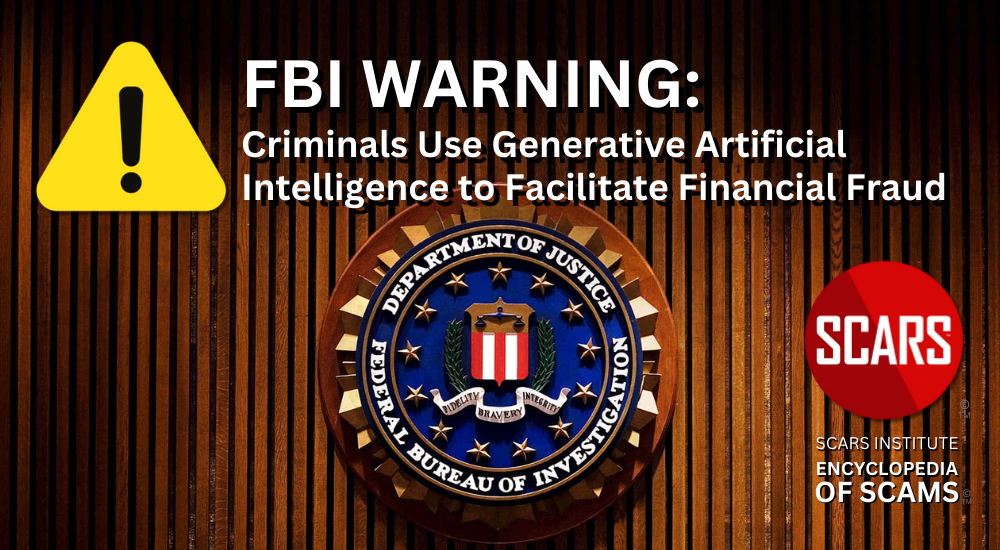
SCARS Institute’s Encyclopedia of Scams™ Published Continuously for 25 Years

Criminals Use Generative Artificial Intelligence to Facilitate Financial Fraud
FBI Warning About How Criminals Exploit Generative Artificial Intelligence (AI) to Escalate Fraud, Impersonation, and Extortion Schemes
FBI WARNING – Presented by the SCARS Institute
Authors:
• United States Federal Bureau of Investigation (FBI)
• SCARS Institute Encyclopedia of Scams Editorial Team – Society of Citizens Against Relationship Scams Inc.
Article Abstract
The FBI has issued a warning about the increasing use of generative artificial intelligence (AI) by criminals to execute fraud on a broader and more convincing scale. Generative AI allows these fraudsters to produce realistic text, images, audio, and videos, thereby enhancing the believability of their schemes. This technology is exploited in various fraudulent activities including social engineering, spear phishing, romance, and investment scams, where AI can generate content that appears legitimate, reducing telltale signs of deceit like grammatical errors. AI-generated materials are used to create fake social media profiles, counterfeit documents, and even to impersonate individuals through voice cloning or video manipulation to deceive victims into sending money or divulging sensitive information.
The FBI advises the public to be vigilant, suggesting measures like establishing secret verification phrases with family, scrutinizing media for anomalies, and being cautious with personal information shared online. If one suspects they’ve been scammed, they should report it to the FBI’s Internet Crime Complaint Center, providing detailed information about the interaction and transactions involved.

FBI Warning About How Criminals Exploit Generative Artificial Intelligence (AI) to Escalate Fraud, Impersonation, and Extortion Schemes
Introduction
FBI WARNING
The FBI is warning the public that criminals exploit generative artificial intelligence (AI) to commit fraud on a larger scale which increases the believability of their schemes. Generative AI reduces the time and effort criminals must expend to deceive their targets. Generative AI takes what it has learned from examples input by a user and synthesizes something entirely new based on that information. These tools assist with content creation and can correct for human errors that might otherwise serve as warning signs of fraud. The creation or distribution of synthetic content is not inherently illegal; however, synthetic content can be used to facilitate crimes, such as fraud and extortion.1 Since it can be difficult to identify when content is AI-generated, the FBI is providing the following examples of how criminals may use generative AI in their fraud schemes to increase public recognition and scrutiny.
AI-Generated Text
Criminals use AI-generated text to appear believable to a reader in furtherance of social engineering,2 spear phishing,3 and financial fraud schemes such as romance, investment, and other confidence schemes or to overcome common indicators of fraud schemes.
- Criminals use generative AI to create voluminous fictitious social media profiles used to trick victims into sending money.
- Criminals create messages to send to victims faster allowing them to reach a wider audience with believable content.
- Criminals use generative AI tools to assist with language translations to limit grammatical or spelling errors for foreign criminal actors targeting US victims.
- Criminals generate content for fraudulent websites for cryptocurrency investment fraud and other investment schemes.
- Criminals embed AI-powered chatbots in fraudulent websites to prompt victims to click on malicious links.
AI-Generated Images
Criminals use AI-generated images to create believable social media profile photos, identification documents, and other images in support of their fraud schemes.
- Criminals create realistic images for fictitious social media profiles in social engineering, spear phishing, romance schemes, confidence fraud, and investment fraud.
- Criminals generate fraudulent identification documents, such as fake driver’s licenses or credentials (law enforcement, government, or banking) for identity fraud and impersonation schemes.
- Criminals use generative AI to produce photos to share with victims in private communications to convince victims they are speaking to a real person.
- Criminals use generative AI tools to create images of celebrities or social media personas promoting counterfeit products or non-delivery schemes.4
- Criminals use generative AI tools to create images of natural disasters or global conflicts to elicit donations to fraudulent charities.
- Criminals use generative AI tools to create images used in market manipulation schemes.
- Criminals use generative AI tools to create pornographic photos of a victim to demand payment in sextortion schemes.
AI-Generated Audio, aka Vocal Cloning
Criminals can use AI-generated audio to impersonate well-known, public figures or personal relations to elicit payments.
- Criminals generate short audio clips containing a loved one’s voice to impersonate a close relative in a crisis situation, asking for immediate financial assistance or demanding a ransom.
- Criminals obtain access to bank accounts using AI-generated audio clips of individuals and impersonating them.
AI-Generated Videos
Criminals use AI-generated videos to create believable depictions of public figures to bolster their fraud schemes.
- Criminals generate videos for real-time video chats with alleged company executives, law enforcement, or other authority figures.
- Criminals create videos for private communications to “prove” the online contact is a “real person.”
- Criminals use generative AI tools to create videos for fictitious or misleading promotional materials for investment fraud schemes.
Tips to protect yourself
- Create a secret word or phrase with your family to verify their identity.
- Look for subtle imperfections in images and videos, such as distorted hands or feet, unrealistic teeth or eyes, indistinct or irregular faces, unrealistic accessories such as glasses or jewelry, inaccurate shadows, watermarks, lag time, voice matching, and unrealistic movements.
- Listen closely to the tone and word choice to distinguish between a legitimate phone call from a loved one and an AI-generated vocal cloning.
- If possible, limit the online content of your image or voice, make social media accounts private, and limit followers to people you know to minimize fraudsters’ capabilities to use generative AI software to create fraudulent identities for social engineering.
- Verify the identity of the person calling you by hanging up the phone, researching the contact of the bank or organization purporting to call you, and call the phone number directly.
- Never share sensitive information with people you have met only online or over the phone.
- Do not send money, gift cards, cryptocurrency, or other assets to people you do not know or have met only online or over the phone.
- Identifying information about the individuals including name, phone number, address, and email address.
- Financial transaction information such as the date, type of payment, amount, account numbers involved, the name and address of the receiving financial institution, and receiving cryptocurrency addresses.
- Describe your interaction with the individual, including how contact was initiated, such as the type of communication, the purpose of the request for money, how you were told or instructed to make payment, what information you provided to the scammer, and any other details pertinent to your complaint.
Definitions
-/ 30 /-
What do you think about this?
Please share your thoughts in a comment below!
Table of Contents
- FBI Warning About How Criminals Exploit Generative Artificial Intelligence (AI) to Escalate Fraud, Impersonation, and Extortion Schemes
- Article Abstract
- FBI Warning About How Criminals Exploit Generative Artificial Intelligence (AI) to Escalate Fraud, Impersonation, and Extortion Schemes
- Introduction
- FBI WARNING
- AI-Generated Text
- AI-Generated Images
- AI-Generated Audio, aka Vocal Cloning
- Definitions
LEAVE A COMMENT?
Recent Comments
On Other Articles
- Arwyn Lautenschlager on Love Bombing And How Romance Scam Victims Are Forced To Feel: “I was love bombed to the point that I would do just about anything for the scammer(s). I was told…” Feb 11, 14:24
- on Dani Daniels (Kira Lee Orsag): Another Scammer’s Favorite: “You provide a valuable service! I wish more people knew about it!” Feb 10, 15:05
- on Danielle Delaunay/Danielle Genevieve – Stolen Identity/Stolen Photos – Impersonation Victim UPDATED 2024: “We highly recommend that you simply turn away form the scam and scammers, and focus on the development of a…” Feb 4, 19:47
- on The Art Of Deception: The Fundamental Principals Of Successful Deceptions – 2024: “I experienced many of the deceptive tactics that romance scammers use. I was told various stories of hardship and why…” Feb 4, 15:27
- on Danielle Delaunay/Danielle Genevieve – Stolen Identity/Stolen Photos – Impersonation Victim UPDATED 2024: “Yes, I’m in that exact situation also. “Danielle” has seriously scammed me for 3 years now. “She” (he) doesn’t know…” Feb 4, 14:58
- on An Essay on Justice and Money Recovery – 2026: “you are so right I accidentally clicked on online justice I signed an agreement for 12k upfront but cd only…” Feb 3, 08:16
- on The SCARS Institute Top 50 Celebrity Impersonation Scams – 2025: “Quora has had visits from scammers pretending to be Keanu Reeves and Paul McCartney in 2025 and 2026.” Jan 27, 17:45
- on Scam Victims Should Limit Their Exposure To Scam News & Scammer Photos: “I used to look at scammers photos all the time; however, I don’t feel the need to do it anymore.…” Jan 26, 23:19
- on After A Scam, No One Can Tell You How You Will React: “This article was very informative, my scams happened 5 years ago; however, l do remember several of those emotions and/or…” Jan 23, 17:17
- on Situational Awareness and How Trauma Makes Scam Victims Less Safe – 2024: “I need to be more observant and I am practicing situational awareness. I’m saving this article to remind me of…” Jan 21, 22:55
ARTICLE META
Important Information for New Scam Victims
- Please visit www.ScamVictimsSupport.org – a SCARS Website for New Scam Victims & Sextortion Victims
- Enroll in FREE SCARS Scam Survivor’s School now at www.SCARSeducation.org
- Please visit www.ScamPsychology.org – to more fully understand the psychological concepts involved in scams and scam victim recovery
If you are looking for local trauma counselors please visit counseling.AgainstScams.org or join SCARS for our counseling/therapy benefit: membership.AgainstScams.org
If you need to speak with someone now, you can dial 988 or find phone numbers for crisis hotlines all around the world here: www.opencounseling.com/suicide-hotlines
A Note About Labeling!
We often use the term ‘scam victim’ in our articles, but this is a convenience to help those searching for information in search engines like Google. It is just a convenience and has no deeper meaning. If you have come through such an experience, YOU are a Survivor! It was not your fault. You are not alone! Axios!
A Question of Trust
At the SCARS Institute, we invite you to do your own research on the topics we speak about and publish, Our team investigates the subject being discussed, especially when it comes to understanding the scam victims-survivors experience. You can do Google searches but in many cases, you will have to wade through scientific papers and studies. However, remember that biases and perspectives matter and influence the outcome. Regardless, we encourage you to explore these topics as thoroughly as you can for your own awareness.
Statement About Victim Blaming
SCARS Institute articles examine different aspects of the scam victim experience, as well as those who may have been secondary victims. This work focuses on understanding victimization through the science of victimology, including common psychological and behavioral responses. The purpose is to help victims and survivors understand why these crimes occurred, reduce shame and self-blame, strengthen recovery programs and victim opportunities, and lower the risk of future victimization.
At times, these discussions may sound uncomfortable, overwhelming, or may be mistaken for blame. They are not. Scam victims are never blamed. Our goal is to explain the mechanisms of deception and the human responses that scammers exploit, and the processes that occur after the scam ends, so victims can better understand what happened to them and why it felt convincing at the time, and what the path looks like going forward.
Articles that address the psychology, neurology, physiology, and other characteristics of scams and the victim experience recognize that all people share cognitive and emotional traits that can be manipulated under the right conditions. These characteristics are not flaws. They are normal human functions that criminals deliberately exploit. Victims typically have little awareness of these mechanisms while a scam is unfolding and a very limited ability to control them. Awareness often comes only after the harm has occurred.
By explaining these processes, these articles help victims make sense of their experiences, understand common post-scam reactions, and identify ways to protect themselves moving forward. This knowledge supports recovery by replacing confusion and self-blame with clarity, context, and self-compassion.
Additional educational material on these topics is available at ScamPsychology.org – ScamsNOW.com and other SCARS Institute websites.
Psychology Disclaimer:
All articles about psychology and the human brain on this website are for information & education only
The information provided in this article is intended for educational and self-help purposes only and should not be construed as a substitute for professional therapy or counseling.
While any self-help techniques outlined herein may be beneficial for scam victims seeking to recover from their experience and move towards recovery, it is important to consult with a qualified mental health professional before initiating any course of action. Each individual’s experience and needs are unique, and what works for one person may not be suitable for another.
Additionally, any approach may not be appropriate for individuals with certain pre-existing mental health conditions or trauma histories. It is advisable to seek guidance from a licensed therapist or counselor who can provide personalized support, guidance, and treatment tailored to your specific needs.
If you are experiencing significant distress or emotional difficulties related to a scam or other traumatic event, please consult your doctor or mental health provider for appropriate care and support.
Also read our SCARS Institute Statement about Professional Care for Scam Victims – click here to go to our ScamsNOW.com website.
















Thank you for your comment. You may receive an email to follow up. We never share your data with marketers.